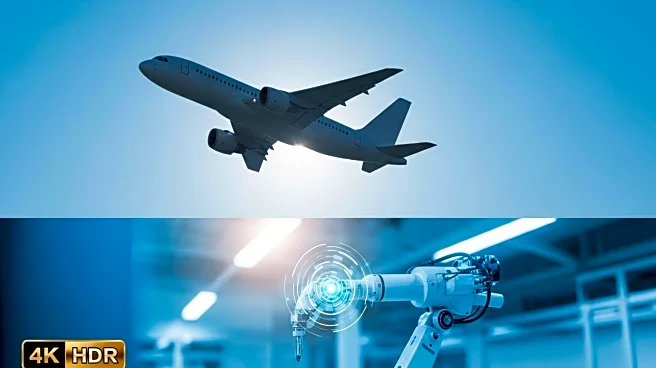What's Happening?
Lufthansa, Germany's largest airline, has announced plans to cut 4,000 jobs by 2030, primarily in administrative roles based in Germany. This decision is part of a broader strategy to enhance efficiency through digitalization and automation. The airline aims to generate over 2.5 billion euros in free cash flow annually and has set earnings targets of 8%-10% over the next two years. Additionally, Lufthansa plans to invest 600 million euros in a cargo hub at Frankfurt airport. This announcement comes as European stocks are set to open higher, with investors closely monitoring the potential impact of a U.S. government shutdown.
Why It's Important?
The job cuts at Lufthansa reflect a significant shift in the airline industry towards automation and digitalization, which could lead to increased operational efficiency and cost savings. This move may influence other airlines to adopt similar strategies, potentially reshaping the employment landscape within the sector. The investment in a cargo hub at Frankfurt airport indicates a focus on expanding logistics capabilities, which could enhance Lufthansa's competitive position in the global cargo market. The broader economic context, including the potential U.S. government shutdown, adds uncertainty to the market, affecting investor sentiment and stock performance.
What's Next?
Lufthansa's strategic shift may prompt reactions from labor unions and employees affected by the job cuts, potentially leading to negotiations or protests. The airline's focus on automation could drive further investments in technology and infrastructure, influencing industry standards and practices. As Lufthansa implements its plans, other airlines may evaluate similar strategies to remain competitive. The potential U.S. government shutdown could have broader implications for international markets, affecting trade and economic stability.
Beyond the Headlines
The move towards automation raises ethical considerations regarding job displacement and the need for workforce retraining. As industries increasingly rely on technology, there may be a growing demand for policies that support affected workers and promote skill development. The investment in cargo infrastructure highlights the importance of logistics in global trade, potentially influencing supply chain dynamics and international commerce.










